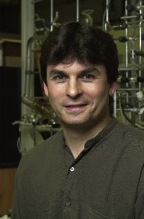
Abstract
Graphene is the ultimate two-dimensional material consisting of a single layer of sp2 hybridized carbon. Here we explore different approaches to synthesize this carbon allotrope, ranging from chemical conversion to vapor phase deposition. Briefly, graphite can be converted into graphene oxide (GO) sheets, which readily disperse in water, and then can be reduced by various methods. Due to its unique ability to be solution processed and patterned, GO and chemically converted graphene (CCG) hold promise for applications ranging from sensors to transparentconducting electrodes for flexible solar cells, etc. Chemical vapor deposition onto metal substrates enables the growth of continuous, large-area graphene. The challenges of growing graphene, controlling the number of layers, transferring graphene and some exciting uses such as flash memory and laser scribed graphene for supercapacitors will be discussed.
Biography
Richard B. Kaner received a Ph.D. in inorganic chemistry from the University of Pennsylvania in 1984 working with Prof. Alan MacDiarmid (Nobel Laureate 2000). After carrying out postdoctoral research at the University of California, Berkeley, he joined the University of California, Los Angeles (UCLA) in 1987 as an Assistant Professor. He was promoted to Associate Professor with tenure in 1991, became a Full Professor in 1993 and a Distinguished Professor in 2012. He has published over 275 papers in top peer reviewed journals and holds 16 U.S. patents with 20 more pending. Professor Kaner has received awards from the Dreyfus, Fulbright, Guggenheim and Sloan Foundations as well as the Exxon Fellowship in Solid State Chemistry, the Buck-Whitney Research Award, the Tolman Medal and the Award in the Chemistry of Materials from the American Chemical Society for his work on refractory materials including new synthetic routes to ceramics, intercalation compounds,superhard metals, graphene and conducting polymers. He has been elected a Fellow of both the American Association for the Advancement of Science (AAAS) and the Materials Research Society (MRS). Along with appointments in the Departments of Chemistry and Materials Science & Engineering,Professor Kaner served as the Associate Director of the California NanoSystems Institute from 2007-09. Professor Kaner’s teaching has been recognized with the Hanson-Dow Award for Excellence in Teaching, the Harriet and Charles Luckman Distinguished Teaching Award and the Gold Shield Faculty Prize for Academic Excellence.